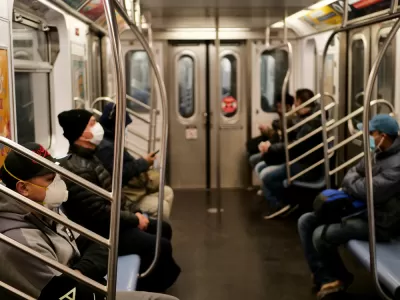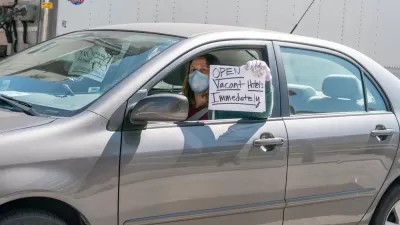There is little evidence that the New York Subway is spreading the coronavirus, according to analysis by Alon Levy.

Alon Levy writes a rebuttal to arguments about the role of the New York Subway in spreading the coronavirus, especially a paper by MIT economist Jeffrey Harris, "claiming that the subways did in fact seed the Covid-19 epidemic in New York." According to Levy, however, Harris cites no evidence in building this argument, and so Levy debunks the paper.
After considering the low infection rates in other high-transit cities worldwide, Levy returns the focus to New York City:
So the question is not whether rapid transit systems are inherently unsafe for riders, which they are not. It’s whether New York, with all of its repeated failings killing tens of workers from exposure to the virus, has an unsafe rapid transit system. Nonetheless, the answer appears to be negative: no evidence exists that the subway is leading to higher infection rates, and the paper does not introduce any.
Levy takes on both of two central claims in the paper—one about infection rates in Manhattan relative to other boroughs and the second about high infection rates in neighborhoods adjacent to subway lines. According to Levy, "neither is even remotely correct."
The details of Levy's counterargument are best left to the source article, which is linked below, although other public health and transit experts also spoke out against the findings of Harris's paper, as evident in an article written by Aaron Gordon for Motherboard.
FULL STORY: The Subway is Probably not Why New York is a Disaster Zone

Maui's Vacation Rental Debate Turns Ugly
Verbal attacks, misinformation campaigns and fistfights plague a high-stakes debate to convert thousands of vacation rentals into long-term housing.

Planetizen Federal Action Tracker
A weekly monitor of how Trump’s orders and actions are impacting planners and planning in America.

In Urban Planning, AI Prompting Could be the New Design Thinking
Creativity has long been key to great urban design. What if we see AI as our new creative partner?

King County Supportive Housing Program Offers Hope for Unhoused Residents
The county is taking a ‘Housing First’ approach that prioritizes getting people into housing, then offering wraparound supportive services.

Researchers Use AI to Get Clearer Picture of US Housing
Analysts are using artificial intelligence to supercharge their research by allowing them to comb through data faster. Though these AI tools can be error prone, they save time and housing researchers are optimistic about the future.

Making Shared Micromobility More Inclusive
Cities and shared mobility system operators can do more to include people with disabilities in planning and operations, per a new report.
Urban Design for Planners 1: Software Tools
This six-course series explores essential urban design concepts using open source software and equips planners with the tools they need to participate fully in the urban design process.
Planning for Universal Design
Learn the tools for implementing Universal Design in planning regulations.
planning NEXT
Appalachian Highlands Housing Partners
Mpact (founded as Rail~Volution)
City of Camden Redevelopment Agency
City of Astoria
City of Portland
City of Laramie





























